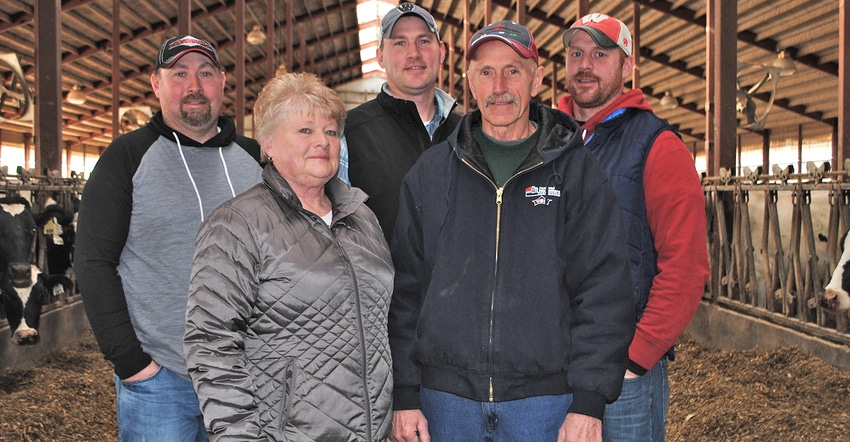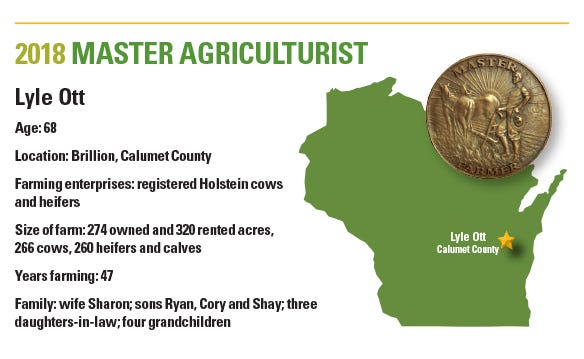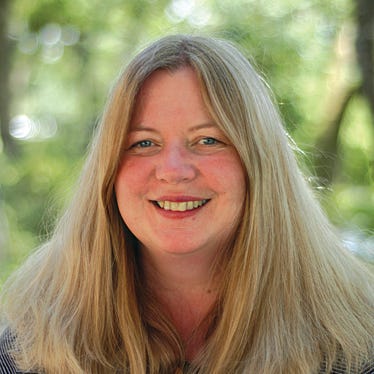
2018 Master Agriculturist Lyle Ott grew up on a farm near Brillion in Calumet County, Wis., and he still farms there today. Lyle’s grandfather bought part of the farm in 1904.
In 2015, Lyle and his wife, Sharon, received the Century Farm Award at the Wisconsin State Fair for having a farm that has been continuously owned by the same family for 100 years or more.
“I grew up on my parents’ farm, where they were milking 25 cows and farming 120 acres,” Lyle says. “The cows were sold in the early 1960s. We began milking again as heifers calved.”
In 1964, when Lyle was a high school freshman, he received a registered calf. “My interest in registered Holstein cattle developed from owning that calf and showing it at the county and state fairs,” he says.
While in high school, Lyle’s parents added on to the barn, expanding from 26 to 48 stalls. They also put in a barn cleaner and converted from cans to a bulk tank.
Continuing the tradition
After graduation, Lyle enrolled at University of Wisconsin-Platteville, where he was a member of the dairy judging team. His dad had health issues, so he spent weekends home on the farm. In 1971, Lyle graduated with a bachelor’s degree in tech agriculture and went home to farm.
In 1973, Lyle married Sharon, his high school sweetheart; they purchased the farm and started River-Bridge Holsteins.
“In the late 1970s, we expanded the barn to 58 stalls; added a pipeline, manure storage, heifer housing, Harvestore feed storage; and converted to Grade A with Lake to Lake,” Lyle recalls. They also bought 35 acres. “In 1978, we began using embryo transfer to increase the number of offspring from our best cows and improve the genetics of our herd.”
Then in August 1981, tragedy struck. “A fire destroyed our barn and feed storage, and we lost some of our machinery,” Lyle says. One cow died. The cows were moved a half mile away to a neighbor’s empty barn.
A decision was made to rebuild, and the Otts moved into their new barn on Christmas Eve in 1981 — just four months after the fire.
“This was only made possible with great support from family, friends, neighbors and new friends,” Lyle says.
In the late 1980s, they bought 100 acres.
“For the next 20 years, our emphasis was on improving and marketing genetics,” Lyle says.

River-Bridge Rotate Duchess, Very Good 87, a Rotate out of River-Bridge Tony Dream EX-90, became the focal point of their marketing program. Worldwide interest was created by Duchess and her offspring. Bull calves were marketed to Japan, South America and Australia. Embryos from the Duchess family were sold to many foreign countries.
“One-third of our herd traces back to Duchess,” Lyle says.
Other cow families created interest, which resulted in 26 bulls entering young sire programs in the U.S. Four of those became proven sires.
About one-third of their calves are genomic-tested. Currently, four high-genomic bulls are being marketed as young sires. River-Bridge Holsteins has received 11 Progressive Breeder awards and 20 Progressive Genetics awards. They have bred or developed over 50 Excellent cows.
The Otts grow 270 acres of corn for silage and 280 acres of alfalfa for haylage.
“We do all of our own fieldwork except chopping corn silage and hauling manure,” Lyle says.
Next generation
After graduating from UW-Madison Farm and Industry Short Course, each of the Otts three sons — Ryan, 41, Cory, 39, and Shay, 32 — worked off the farm. After much discussion, a limited liability company was formed in 2006, and a 240-stall freestall barn was built with a double-10 milking parlor and manure storage.
Lyle and his sons poured concrete, put in the freestalls and did a lot of work themselves on the barn, saving on labor costs.
Today, their rolling herd average is 27,313 pounds of milk, with 956 pounds of butterfat and 845 pounds of protein on twice-a-day milking. Their herd’s somatic cell count is 146,000.
Cory is the herdsman and handles the breeding. Shay takes care of the heifers, calves and registrations. Ryan mixes feed and manages the crops. Lyle works in all areas. Everyone helps with maintenance, cropping and building projects. The Otts employ three part-time milkers. Sharon does the bookkeeping and lawn care, helps with fieldwork, and provides day care for their four grandchildren. All three boys are married, and their wives have off-farm jobs.
In December, the Otts bought a computerized activity and rumen-monitoring system. Their focus now is to get better, not bigger.
“We have the right size buildings and the right amount of land, and we don’t need to add to the milk surplus,” Cory says. “We all get time off — we just can’t all be off at the same time. We are focusing on things that make life easier. More milk means more manure and more labor, and I’m not sure it’s worth it.”
Community involvement
Lyle has been a member of the Forest Junction Fire Department for 40 years. He was on the Calumet County board of supervisors from 2012-16. He now serves on the county parks commission, planning and zoning commission and Brillion Library board.
Lyle was a county dairy judging coach and the Friendly Valley 4-H Club dairy leader. The club won the Hoard’s Dairyman Judging Contest twice — once when sons Ryan and Cory were on the team and again when son Shay was on the team. More than 1,000 clubs enter the contest.
Lyle has also been a Northstar Select Sires member for 40 years, serving on the board of directors since 1989. He has been a member of Farm Bureau and the county, state and national Holstein associations for 40 years, as well. He is active in his church and returned from his first mission trip to Haiti in January.
“I’m thankful my family gives me time off to participate in these activities,” Lyle says.
About the Author(s)
You May Also Like






